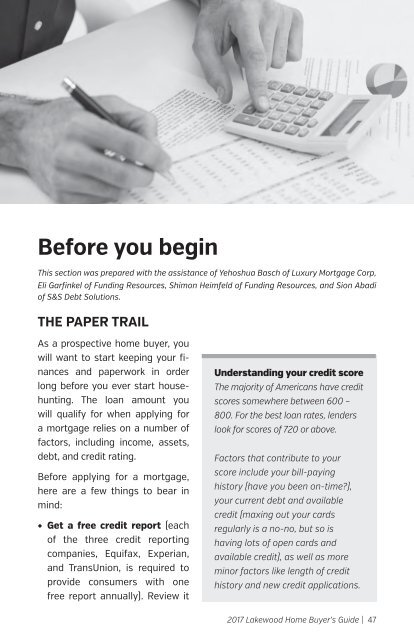2017complete3
Create successful ePaper yourself
Turn your PDF publications into a flip-book with our unique Google optimized e-Paper software.
Before you begin<br />
This section was prepared with the assistance of Yehoshua Basch of Luxury Mortgage Corp,<br />
Eli Garfinkel of Funding Resources, Shimon Heimfeld of Funding Resources, and Sion Abadi<br />
of S&S Debt Solutions.<br />
The paper trail<br />
As a prospective home buyer, you<br />
will want to start keeping your finances<br />
and paperwork in order<br />
long before you ever start househunting.<br />
The loan amount you<br />
will qualify for when applying for<br />
a mortgage relies on a number of<br />
factors, including income, assets,<br />
debt, and credit rating.<br />
Before applying for a mortgage,<br />
here are a few things to bear in<br />
mind:<br />
• Get a free credit report (each<br />
of the three credit reporting<br />
companies, Equifax, Experian,<br />
and TransUnion, is required to<br />
provide consumers with one<br />
free report annually). Review it<br />
Understanding your credit score<br />
The majority of Americans have credit<br />
scores somewhere between 600 –<br />
800. For the best loan rates, lenders<br />
look for scores of 720 or above.<br />
Factors that contribute to your<br />
score include your bill-paying<br />
history (have you been on-time?),<br />
your current debt and available<br />
credit (maxing out your cards<br />
regularly is a no-no, but so is<br />
having lots of open cards and<br />
available credit), as well as more<br />
minor factors like length of credit<br />
history and new credit applications.<br />
2017 Lakewood Home Buyer’s Guide | 47


